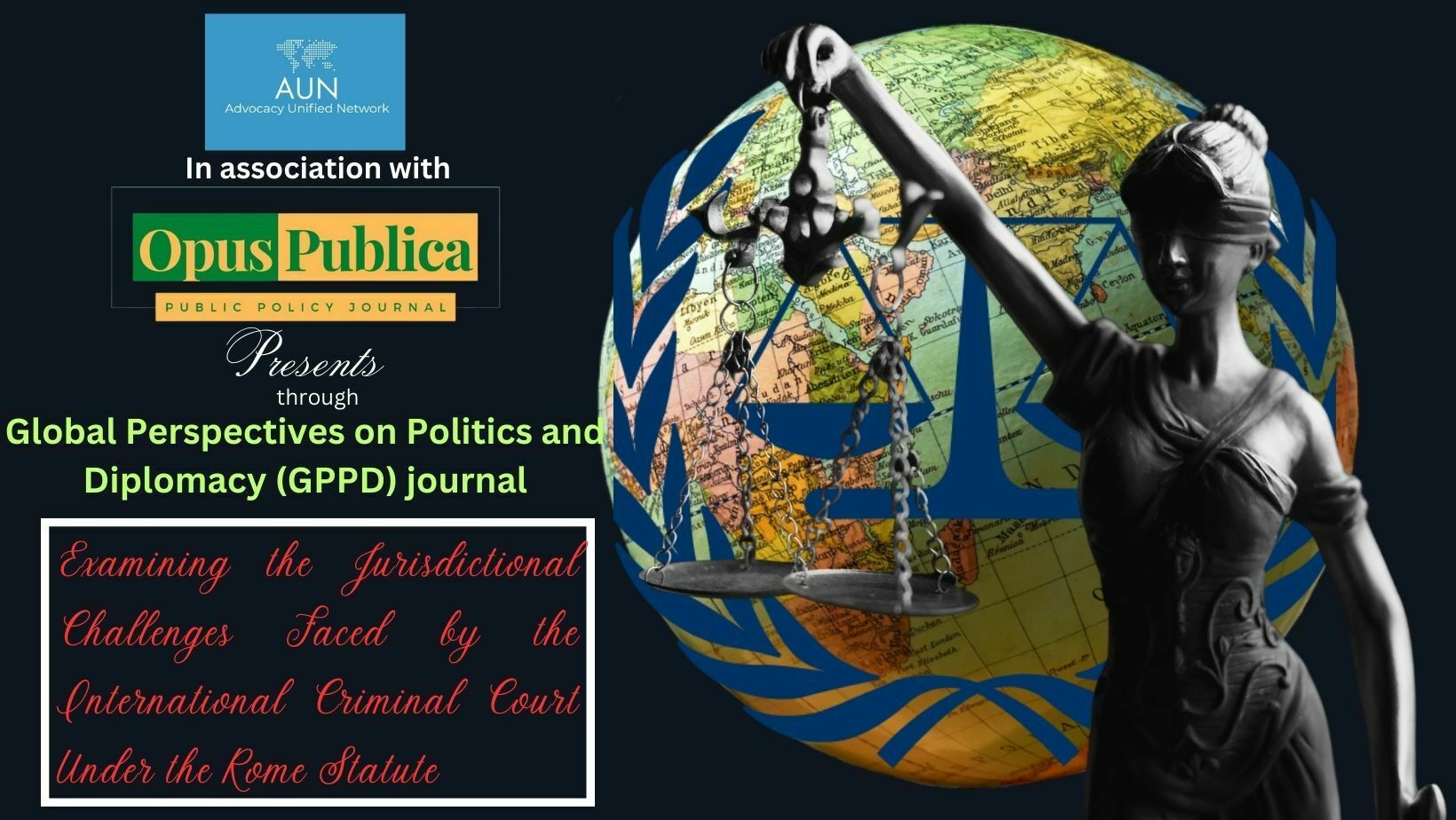The research paper “Examining the Jurisdictional Challenges Faced by the International Criminal Court Under the Rome Statute” offers a thorough overview of the jurisdictional difficulties the International Criminal Court (ICC) faces when investigating crimes worldwide. The journal article, written by Arindam Bhattacharya and published in the Global Perspectives on Politics and Diplomacy (GPPD) journal of Opus Publica, provides important insights into how these difficulties affect the ICC’s performance, standing, and capacity to advance global justice. The study clarifies the complexities of jurisdictional issues and their effects through case studies in Darfur, Uganda, the Democratic Republic of the Congo, and Libya, highlighting the significance of comprehending the logistical, political, and legal difficulties the ICC encounters in various contexts.

Introduction
1.1 Background and Context
The introduction sets the stage by providing an overview of the International Criminal Court and its mandate to prosecute individuals responsible for serious international crimes. It emphasises the significance of jurisdictional challenges in hindering the ICC’s mission and lays the foundation for the subsequent analysis.
Literature Review
2.1 Overview of Existing Research
This section comprehensively reviews existing literature on the ICC’s jurisdictional difficulties. It examines the limitations of the Rome Statute, challenges in prosecuting individuals from non-member states, and the political, diplomatic, and legal obstacles that affect the ICC’s jurisdictional authority. Additionally, the review explores the impact of jurisdictional challenges on the ICC’s investigation and trial effectiveness and the implications for accountability and justice.
Methodology
3.1 Qualitative Approach
The methodology section discusses the qualitative approach employed in the study. It carefully analyses relevant literature, including books, academic papers, reports, and legal documents. Ethical considerations are addressed, clarifying that the study does not involve data collection from human subjects.
Provisions of the Rome Statute and Their Impact on Jurisdiction
4.1 Scope and Difficulties in Prosecuting International Crimes
This section delves into the provisions of the Rome Statute, focusing on the jurisdictional aspects related to crimes of genocide, crimes against humanity, war crimes, and the crime of aggression. It examines the challenges the ICC faces in prosecuting these crimes and their implications for jurisdiction.
4.2 Limitations of Jurisdiction: Temporal, Personal, and Territorial
Here, the analysis explores the jurisdictional limitations concerning temporal, personal, and territorial jurisdiction. It discusses the complexities arising from the ICC’s jurisdictional authority and its implications for the court’s ability to address crimes worldwide.
4.3 Complementarity and Its Implications
This sub-section examines the concept of complementarity and its implications for the ICC’s jurisdictional authority. It explores the interplay between the ICC and national jurisdictions, emphasising the importance of complementarity in advancing international justice.
Case Studies
5.1 Darfur: Challenges in Establishing Jurisdiction and Combating Impunity
The case study on Darfur highlights the progress made by the ICC in addressing crimes committed in the region. It also underscores the challenges encountered in establishing jurisdiction and combating impunity, providing insights into the ICC’s jurisdictional dilemmas.
5.2 Uganda: Balancing Jurisdictional Demands and National Reconciliation
This case study delves into the jurisdictional challenges faced by the ICC in Uganda. It explores the delicate balance between the ICC’s pursuit of justice and the country’s quest for national reconciliation, shedding light on the complexities of navigating jurisdictional demands.
5.3 Democratic Republic of the Congo: Overcoming Security and Logistical Hurdles
Examining the jurisdictional challenges in the Democratic Republic of the Congo, this case study focuses on the security and logistical hurdles the ICC faces. It highlights the efforts undertaken to overcome these challenges and their impact on the ICC’s effectiveness.
5.4 Libya: Navigating Political Transitions and Ensuring Accountability
The case study on Libya delves into the jurisdictional dilemmas arising from political transitions in the country. It explores the ICC’s role in ensuring accountability amidst complex political dynamics, providing insights into the court’s challenges.
Findings and Recommendations
6.1 Complexity of Jurisdictional Disputes and their Impact on ICC Operations
This section presents the study’s key findings, emphasising the complexity of jurisdictional disputes and their impact on the ICC’s operations. It discusses the challenges the ICC faces in investigating crimes, collecting evidence, holding offenders accountable, and providing justice to victims.
6.2 Policy Recommendations for Resolving Jurisdictional Issues
Building upon the findings, this sub-section provides policy recommendations for resolving jurisdictional issues. It highlights the importance of strengthening the legislative framework, improving cooperation channels, enhancing investigative and operational skills, and promoting regional and international collaboration.
Conclusion
7.1 Overcoming Jurisdictional Challenges for Advancing International Justice
The conclusion synthesises the main insights of the research paper. It emphasises the need to overcome jurisdictional challenges and underlines the ICC’s duty to ensure accountability, defend human rights, and promote international justice. It reinforces the importance of consistent commitment, collaboration, and effective policies in achieving these objectives.
Limitations and Future Directions
8.1 Acknowledging Methodological Limitations
This section acknowledges the limitations of the methodology, including reliance on available sources and the influence of perspectives and interpretations presented in the literature. It encourages further research and suggests avenues for future exploration of jurisdictional challenges faced by the ICC.
Overall, this report provides a comprehensive analysis of the jurisdictional challenges the ICC faces and offers insights into the implications for the court’s operations and potential avenues for improvement. The findings contribute to understanding the complexities involved in pursuing international justice and the need for ongoing efforts to overcome jurisdictional obstacles.
Analysis by:
Francisca Oliviera
Research fellow at Advocacy Unified Network (AUN)
Citation





